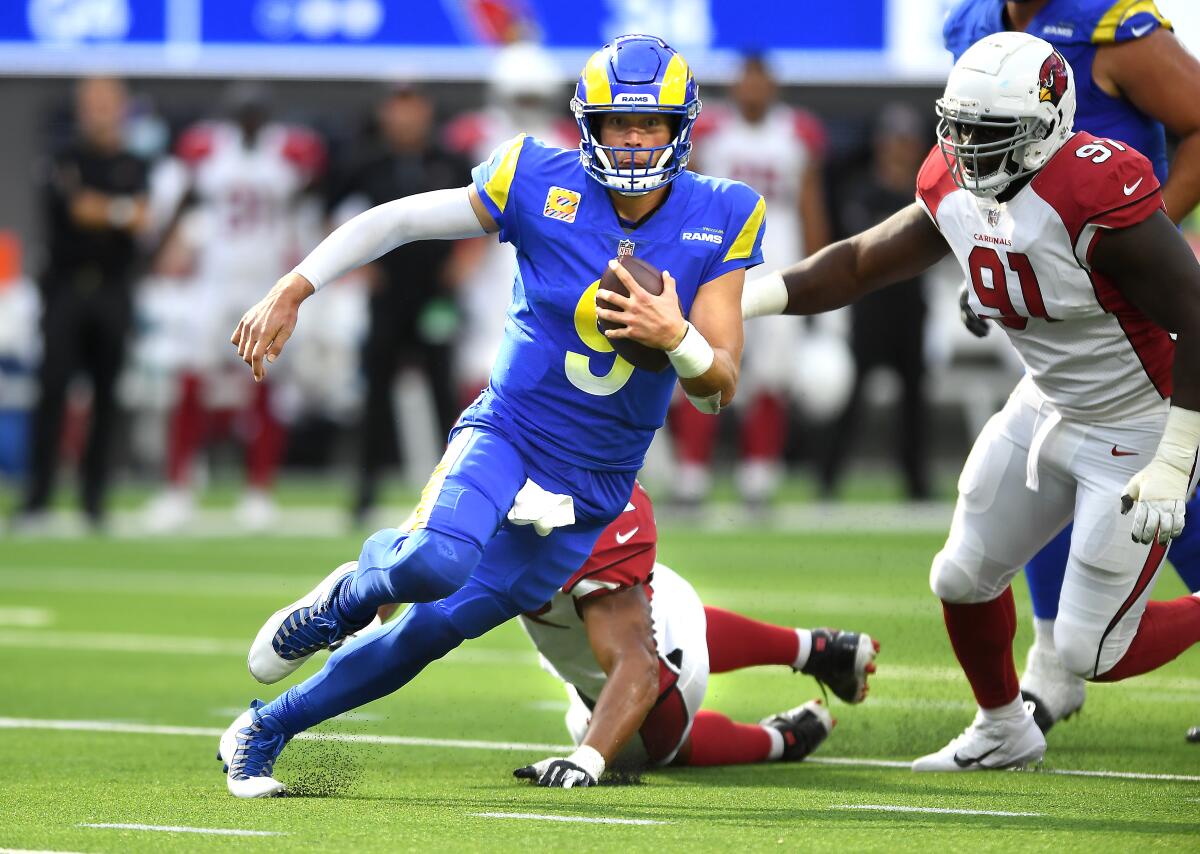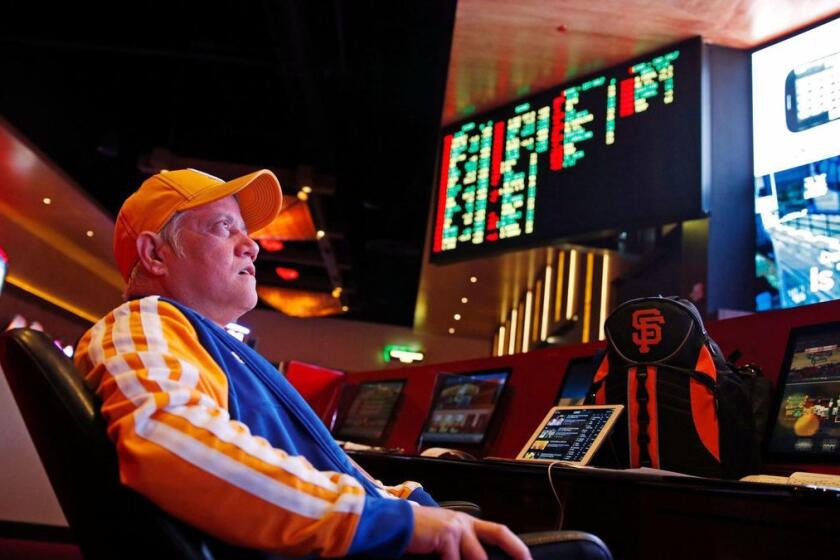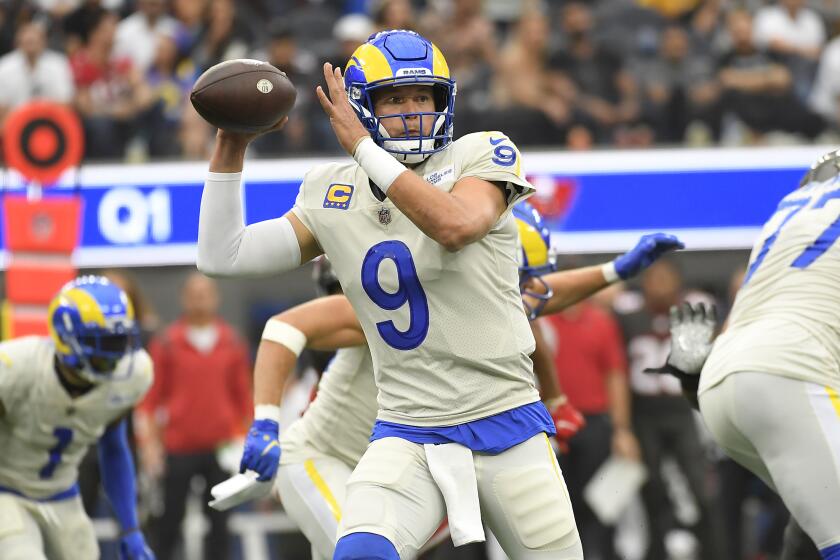ESPN and Fox bet on sports wagering. But will they go all in?

- Share via
Television sports used to acknowledge betting on games with a wink and a nod. Veteran sportscaster Brent Musburger was known for using the term “my guys in the desert” — a reference to Las Vegas gamblers — signaling to viewers that wagering information was coming.
According to Musburger’s nephew Brian Musburger, chief executive of Las Vegas-based betting channel Vegas Stats & Information Network (VSiN), thebroadcaster’s signature line “you’re looking live” was a way to tell viewers to observe the weather conditions in the stadium before betting the over-under for total number of points.
But he could not use actual point spreads, even when he was sitting alongside odds maker Jimmy “The Greek” Snyder in the studio for the CBS Sports pregame show “NFL Live” in the 1970s and ’80s. The NFL wanted no part of the action that was a driving factor for interest in their games, and the league’s TV partners abided by it.
“They would have to say, ’I think they can win by a touchdown or maybe win by a touchdown and a field goal,” Musburger said.
Inside the business of entertainment
The Wide Shot brings you news, analysis and insights on everything from streaming wars to production — and what it all means for the future.
You may occasionally receive promotional content from the Los Angeles Times.
Times have changed dramatically. Since the U.S. Supreme Court in 2018 cleared the way for states to legalize sports betting, the practice has moved out from the shadows and into the limelight faster than just about anyone would have predicted.
Legal sports betting is now available in more than two dozen states and the District of Columbia, though some allow only in-person wagers rather than online play. (California has not yet legalized sports betting.) Over half the adult population in the United States is in a state where some form of sports betting is legal. By 2023, that could grow to more than 80% of adults in the U.S., according to executives.
Global digital betting revenue is estimated to exceed $43 billion in 2025, up from $25.5 billion this year, according to research firm H2 Gambling Capital.
Californians would be able to legally bet on Lakers, Dodgers and Rams games at tribal casinos and horse-racing tracks under an initiative for the November 2022 ballot.
“What was perhaps considered a little bit of a taboo subject historically is now being largely or completely accepted as part of the sports media landscape,” said Freddie Longe, executive vice president and managing director of Endeavor Group-owned betting business IMG Arena.
Endeavor, the owner of agency WME and the Ultimate Fighting Championship, last month announced its acquisition of sports betting platform OpenBet for $1.2 billion in cash and stock.
Sports leagues that once opposed gambling as a threat to the integrity of games have increasingly come to accept the practice.
The NFL, which long distanced itself from wagering, now has sportsbooks such as DraftKings, FanDuel and Caesars as official sponsors, a first for the league. The designation entitles the companies to use the league’s shield logo in its advertising, in a deal reportedly worth $1 billion.
And sports media companies — including ESPN, Fox Sports, CBS Sports and Turner Sports — are seeking a piece of the action.
“The fact that the leagues have all kind of gotten into that business makes it easier for a rights holder like ESPN or Fox or TNT to be in that business as well, because there’s no pushback from the league,” said Eric Johnson, a former ESPN executive and faculty director of UCLA Anderson’s Center for Management of Enterprise in Media, Entertainment and Sports.
Deals with sports betting companies have led to more open discussion of odds and betting information during sports programming and an influx of advertising dollars.
A decade ago, ESPN gambling analyst Doug Kezirian was toiling in Las Vegas as the host of a local radio show that specialized in sports wagering.
Lee Berke, president of the consulting firm LHB Sports, Media & Entertainment, said sportsbook companies are putting 80% of their revenue into marketing. Sports betting has exploded as an advertising category for NFL TV rights-holders Fox, NBC, CBS and ESPN.
“Let’s just say that our fans are really interested in sports betting,” Bob Chapek, chief executive of ESPN parent Walt Disney Co., said last month. “Let’s say that our partners with the leagues are interested in sports betting. So we’re interested in sports betting.”
Attitudes have changed.
Only two years ago, Disney’s then-CEO Bob Iger distanced the company from wagering, saying, “I don’t see the Walt Disney Co., certainly in the near-term, getting involved in the business of gambling, and in fact, facilitating gambling in any way,” though he noted that ESPN would include gambling-related information in its coverage.
ESPN and Caesars Entertainment in August 2020 opened a 6,000-square foot studio facility at the Linq Hotel + Experience in Las Vegas to serve as the home of the company’s sports betting programming, including “The Daily Wager.” ESPN has discussed licensing its brand to sportsbooks, according to a Wall Street Journal report.
Although ESPN, according to executives, has no plans to become a sportsbook and facilitating bets itself, it sees gambling-related coverage as an opportunity to better engage young audiences.
One of ESPN’s channels, ESPNews, has a constant stream of betting odds data along the side and bottom of the screen as it re-airs the flagship network’s news-talk shows “SportsCenter” and “Get Up.” When the recent Monday Night Football contest between the Los Angeles Chargers and Las Vegas Raiders was delayed by weather, the company saw a spike in traffic for an ESPN+ article laying out the odds on the game.
“The content space, for us, has been a really compelling one,” said Mike Morrison, ESPN’s vice president of sports betting and fantasy. “Betting absolutely has to be part of that storytelling and the content that we produce.”
Media companies have greeted the arrival of legalized gambling as a chance to improve ratings as cord cutting accelerates.
The NFL’s start is its strongest since 2016, the year the league faced criticism from then-presidential candidate Donald Trump over players kneeling during the national anthem to protest police violence against the Black community.
The rise of regulated gambling gives viewers a literal investment in the outcome of a game, even if their home team isn’t the one playing, said Abraham J. Wyner, faculty lead of the Wharton Sports Analytics and Business Initiative of the University of Pennsylvania.
“I’ve been a lifelong fan of my favorite teams, particularly the Yankees, and that keeps me interested, but I’m not about to go watch Red Sox-Rays if I don’t have a betting interest or some other kind of interest in the outcome,” Wyner said. “As people are becoming more removed from the actual playing of the game in their lives, betting is a great way to cultivate more interest and deeper interest in the broadcast.”
Legal betting is creating opportunities for TV programming to serve potential bettors, especially those who found the idea of using the local bookie unsavory.
“You definitely have more people who were reluctant to do something that wasn’t considered legal,” said Brian Musburger. “Now there is this large population of mostly men who are embarrassed that they don’t know how to read the information on the board of a Vegas sportsbook. We’re producing a lot of ‘Betting 101’ content to demystify the process without hurting the male ego.”
Most media companies have yet to go all in.
“The question is, are you actually going to be a sportsbook or are you just going to license your name out?” said media analyst Rich Greenfield, of LightShed Partners. “How deeply is it going to be integrated?”
Others have been more overt in their forays into gambling, including Fox Corp. and its Fox Sports unit. CEO Lachlan Murdoch has strong ties to Britain and Australia, where sports wagering has long been normalized.
Wagering platform Fox Bet, which gambling company the Stars Group and Fox Corp. launched through a 2019 partnership, is now available in Colorado, Michigan, New Jersey and Pennsylvania. The deal gave Fox a 4.99% stake in the Stars Group’s U.S. business, which is now owned by gaming company FanDuel’s majority owner, Flutter.
Additionally, Fox this year acquired OutKick Media, sports personality Clay Travis’ popular resource of information and commentary among sports bettors.
Media companies mainly want to cater to casual gamers — those willing to plunk down $10 to $20 on a game — rather than the frequent gamblers who make big, risky bets. Think of something more akin to people who play “Clash of Clans” than Adam Sandler’s problem gambler character in “Uncut Gems.” Part of Fox’s strategy is to convert users of the free-to-play Fox Bet Super 6 app, which allows viewers to make game predictions for cash prizes — into real-money bettors.
“We’re not necessarily looking to go after the hardcore, early adopter,” said Edward Hartman, senior vice president of corporate development at Fox Corp. “The real opportunity we see is what we think will be the fattest part of the bell curve — the mass adoption phase — which is the casual sports fans who love their teams and love watching games and will have a casual wager to enhance their enjoyment of a game.”
There are limits to how far media companies and advertisers can go. The NFL places strict limits on gambling ads during broadcasts. League executives hope to avoid inundating viewers with too many gambling ads after seeing how betting-related marketing hit a saturation point in places like Britain.
Only the seven betting companies with NFL deals are allowed to advertise during pro football broadcasts. The league allows six ads per telecast: one per quarter and one during pregame and halftime.
While odds analysis can bring another level of sophistication to coverage, NFL executives are reluctant to have explicit gambling references during the regular live national broadcasts. Research indicated that audiences don’t want national broadcasts to explicitly include gambling chatter, according to Christopher Halpin, the NFL’s chief strategy and growth officer.
“The bettors say, ‘I don’t need to hear Jim Nantz and Tony Romo talk about sports betting,’” Halpin said. “‘It’s inauthentic. It’s not their area.’”
Berke said that sports TV getting into streaming and multiple telecasts of the same events offers an opportunity to serve the gambling audience without alienating fans who are less comfortable with wagering talk.
“Overall you can see this, sport by sport, they are eager to integrate it in various fashions or provide in particular alternate feeds where gamblers can participate,” said Berke. “But at the same time they don’t want to cross the line and turn off families and turn off non-gamblers and make everything a bet.”
More to Read
Inside the business of entertainment
The Wide Shot brings you news, analysis and insights on everything from streaming wars to production — and what it all means for the future.
You may occasionally receive promotional content from the Los Angeles Times.














